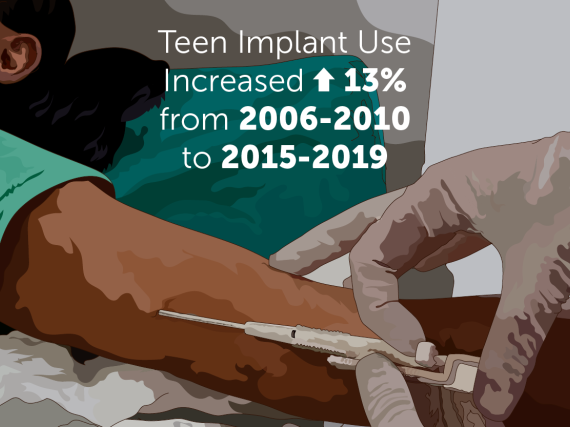Evidence Shows Access to Birth Control Contributes to Higher Graduation Rates
Growing up is stressful, and the pressures that surround young people today are different, and in some ways more challenging, from the pressures I knew growing up. We have long believed that to ensure all young people get the opportunity to live their best life, access to the full range of reproductive health resources and services is critical. Now, we have proof.
A recent study led by the University of Colorado Boulder followed more than 170,000 women for up to seven years. The study was centered around the Colorado Family Planning Initiative (CFPI), which provided funding that made every FDA-approved contraceptive method available at low or no cost to patients receiving care in Colorado’s Title X clinics. Per the findings, when CFPI made all FDA-approved forms of birth control available at every Title X clinic in the state, the percentage of people who graduated high school was 1.66% higher than the baseline level of 88.15%. The impact was even greater among Hispanic women who experienced a 4.86% increase in graduation rate from a baseline level of 77.71%. While these percentage point numbers may look small at first glance, it is important to think of them in terms of people and the full magnitude of the impact of this intervention. The researchers estimate that CFPI reduced the percentage of Colorado women without a high school diploma by 14% and that the initiative resulted in an additional 3,800 Colorado women born between 1994-1996 receiving high school diplomas by age 20-22. This study clearly indicates that investments in access to quality, affordable contraception helps people. The results provide the strongest support to date regarding how access to contraception positively affects people’s educational attainment and subsequent socioeconomic status.
Birth control is linked to a wide array of benefits including fewer unplanned pregnancies, menstrual regulation, clear skin, relief from migraines, PMS and PMDD relief, and more. Birth control also helps people achieve their educational and professional goals. In fact, 86% of college educated women in the workforce say that being able to control if and/or when to become a parent has been important to their career path. Further, 65% of Black female and 64% of Latina small business owners say access to birth control, and the freedom to decide if and when to have children, has impacted their bottom lines as business owners.
Despite the many benefits, not everyone has equitable information about or access to the full range of contraceptive methods. Currently, more than 19 million women of reproductive age living in the US are in need of publicly funded contraception and live-in contraceptive deserts.
We must work to ensure all people, especially young Black and brown people, have access to the full range of contraceptive methods so they can achieve their goals. Colorado should not be the outlier, rather, other states should follow suite and expand access to affordable reproductive health resources and services for all. Unfortunately, we have a long way to go in many places to reach equitable access to the full range of contraceptive methods. In this vein, our contraceptive access fund, BCBenefits, helps people living with low incomes overcome some of the most commonly faced barriers in access to contraception such as direct out of pocket costs and transportation. Eliminating barriers to accessing birth control will help everyone take control of their reproductive health and lives and allow them to say Thanks, Birth Control.



